Which English translation of Journey to the West should I read?
That depends on how much time you want to invest in this Buddhist/Taoist/Confucian classic, one of the four classic novels of China. The complete work is a hundred chapters—over a thousand pages!
If you want a quick-and-dirty recommendation on which version to choose, jump to the conclusion.
Journey to the West: translations in English
There are only two complete translations of the famous Xiyou Ji (Hsi-yu Chi), the one by Anthony C. Yu (which has been revised and republished) and the one by William J.F. Jenner. The rest are abridgements, retellings, and adaptations.
- 1913 – Timothy Richard
- 1930 – Helen M. Hayes
- 1942 – Arthur Waley
- 1964 – George Theiner
- 1977-1983 – Anthony C. Yu (complete version)
- 1982-1984 – William J.F. Jenner (complete version)
- 1992 – David Kherdian
- 2021 – Julia Lovell
When was Journey to the West written?
Over a period of centuries, the account of a real-life monk’s journey evolved into a collection of stories about a god-like monkey. The history of the different Chinese versions of the text is outside the scope of this page.
Who wrote Journey to the West?
It is now and for some time has been fashionable to credit Wu Cheng’en (aka Wu Ch’eng-en), but again, the history of the Chinese text is more complicated than I feel equipped to handle. I have the impression that the story existed in a variety of written and oral versions, and that writers of the day tended not to claim authorship of fictional works.
What is Journey to the West about?
It’s been compared to Pilgrim’s Progress, The Wizard of Oz, the tales of Robin Hood and King Arthur, The Lord of the Rings, Star Wars, and The Ramayana. It quite possibly belongs to more than one genre: satire, allegory, picaresque, folktale, adventure, religion, travelogue, history, fantasy, myth.
Asian Review of Books: “Review of Monkey King by Julia Lovell” by John Darwin Van Fleet
“A band of unlikely, supernatural and flawed heroes join forces for a quest seeking the Holy Grail of their era, sacred Buddhist sutras far away in the West. They encounter spectacular and fantastic dangers, yet survive and [spoiler alert!] return with their treasure, and attain immortality.”
New York Times: “The Complete ‘Monkey’ ” by David Lattimore
“It is the tale of a monk sent to heaven in quest of the basic Buddhist scriptures, accompanied by a Sand Monk, a Monkey King and a pig spirit, among others; their adventures occur on many literary and intellectual levels at once in a story that moves with surprising speed through its many chapters…. It is the story of Tripitaka, an actual monk — his religious name was Xuan-zang — who lived from 602 to 664. He was given the title Tripitaka, which means ‘the three baskets’ or, so to speak, three testaments of the Buddhist scriptures, by a Chinese emperor.”
From Gene Luen Yang’s Foreword to Julia Lovell’s Monkey King:
“This story about a monkey with superpowers has lasted for centuries because it captures something essential about our experience. Sun Wukong might be a monkey, but his anger, anxiety, and arrogance are all too human…. The monkey king’s story reverberates across continents and cultures. Journey to the West is the very definition of timeless.”
What is the structure of Journey to the West?
There are 100 chapters. Jenner’s Translator’s Afterword describes what’s in them:
“The structure of the book is casual; the plots of its episodes all end in predictable success for the travellers; and there are only three fully developed characters in the whole vast story. And yet the book works, and works triumphantly well…. Of the book’s hundred chapters the first twelve tell of the earlier life of two of the chief characters, Monkey and the Tang Priest Sanzang, and of the circumstances in which Emperor Taizong sends Sanzang off on his journey to the Western Heaven to visit the Tathagata Buddha and fetch the Mahayana scriptures…. By far the largest section, chapters 13 to 97, over five-sixths of the whole book, covers the journey itself. The first ten of these chapters include some episodes essential to the whole in which the lone pilgrim Sanzang acquires his three disciples, Monkey, Pig, and Friar Sand, as well as his white dragon horse. The next seventy-five chapters, the adventures of the four travellers and their horse on their fourteen-year journey, are not one but dozens of stories, all self-contained and running from one to five chapters in length. In each episode the travellers are presented with a problem that they have to deal with before they can continue on their way…. The third part, which is also the shortest, is only three chapters long. This is enough to deal with the travellers’ arrival at the Thunder Monastery on Vulture Peak in India, their rather shabby treatment there, their return to China, and their final reward.”
Journey to the West: Translation Comparison
Extracts have been included below so that you can see how the different translations sound.
Journey to the West: Other Info and Resources
For links to online resources and information about various adaptations and a few related books, jump down the page.
Who was Timothy Richard?
He was a Welsh Baptist missionary who lived in China (and traveled to India). Among other writings, he produced a memoir entitled Forty-five Years in China: Reminiscences by Timothy Richard in which he expressed concern for the spiritual, physical, and mental well-being of Chinese men and women.
About the Richard translation of Journey to the West
The full title of Richard’s version is A Mission to Heaven: A Great Chinese Epic and Allegory. It has been republished as The Monkey King’s Amazing Adventures.
Richard believed the author of the original was Ch’iu Chang Ch’un (Qiu Chuji), whom he wrote about in the 39-page introduction to his 362-page translation. The introduction says the work is not a drama, an epic, a book of travels, a collection of stories like the Arabian Nights, a book of Cosmogony, a book of the Forces of Nature, a book of magic, a book of astrology, a Pilgrim’s Progress, a book on anthropology, a text-book of science, or a book on comparative religion, but combines aspects of all these. It highlights two lessons of great value. The first is that the tyranny of a powerful individual (such as Monkey) is intolerable. The second—interestingly—is that the tyranny of a religion set on destroying all other religions is intolerable.
Although it contains all 100 chapters, Richard’s version is not a full translation. The first seven chapters and the last three chapters are translated almost in full, but there are only short summary versions of Chapters 8 to 97, except for Chapter 11 (which describes hell).
Richard names the characters Huen Chwang, Sun Wu Kung, Ch Wu Neng, and Sa Wu Ching.
Journey to the West Research: “The First English Translation” by Jim R. McClanahan
“[T]here are many mistranslations that will become apparent to those who have already read Yu’s version.”
Extract from the Richard translation of Journey to the West
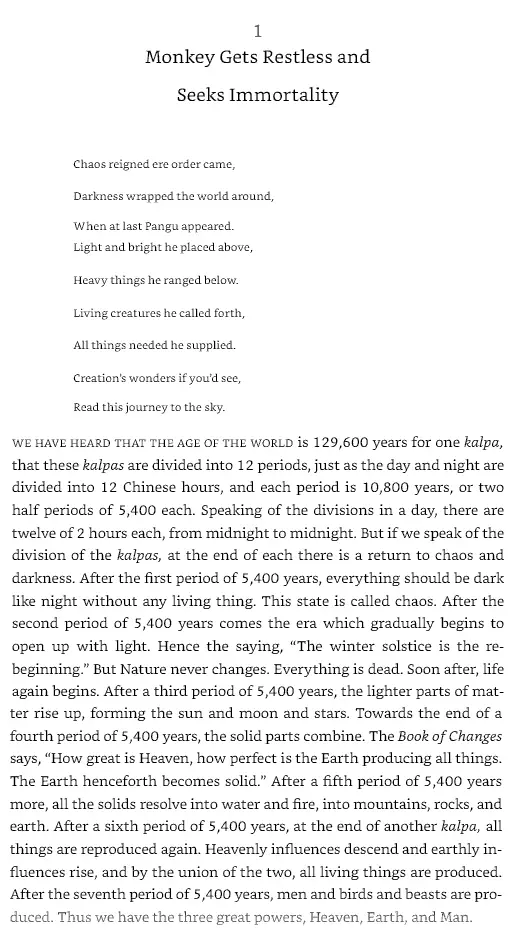
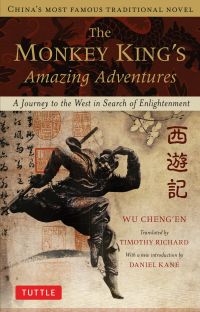
Get the Tuttle Richard translation of A Mission to Heaven (A Journey to Heaven, The Monkey King's Amazing Adventures)
ABRIDGED. Includes an introduction by Daniel Kane. Originally published in 1913; this version published in 2012.
Available as a paperback (ISBN 9780804842723, 256 pages).
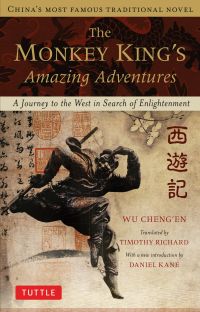
Get the Tuttle Richard translation of A Mission to Heaven (A Journey to Heaven, The Monkey King's Amazing Adventures)
ABRIDGED. Includes an introduction by Daniel Kane. Originally published in 1913; this version published in 2012.
Available as an ebook.
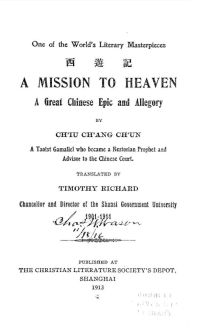
Get the Archive.org Richard translation of A Mission to Heaven (A Journey to Heaven, The Monkey King's Amazing Adventures)
ABRIDGED. Includes an introduction by the translator. Published in 1913.
Available as an ebook.
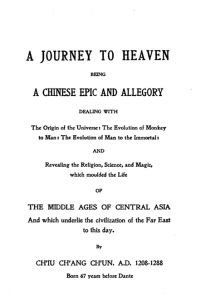
Get the Google Books Richard translation of A Mission to Heaven (A Journey to Heaven, The Monkey King's Amazing Adventures)
ABRIDGED. Includes an introduction by the translator. Published in 1913.
Available as an ebook.
About the Hayes translation of Journey to the West
The title of Hayes’ version is The Buddhist Pilgrim’s Progress: The Records of the Journey to the Western Paradise. It is an abridgement, paraphrase, or adaptation rather than a full translation. It spans only 6 chapters totaling about 100 pages.
It was part of the “Wisdom of the East” series edited by Lancelot Alfred Cranmer-Byng, whose name I encountered while researching Layla and Majnun. The books were intended to be “ambassadors of good-will and understanding between East and West.”
In her introduction, Hayes says the work is an attempt by Wu Ch’eng-en, a scholar and gentleman, to bring “the heights of Buddhist philosophy” to the masses by “interesting and amusing them.” She celebrates its success as entertainment, which continues until today. The introduction tells a little about the life of the author, calling him an “amazingly versatile man” with “friendly sympathy for all the philosophies of his time” and quotes some of his poetry.
Hayes names the main characters Sun the Monkey, Hiuen Tsiang, Chu the Pig, and the Monk Sand. In the introduction she explains what they represent, as, unlike Timothy Richard, she considers the book to be a spiritual parable akin to The Pilgrim’s Progress by John Bunyan.
If you want to know more about the Hayes translation, ask Dr. Xiaofang Wu, who wrote her PhD on it.
“This thesis argues that her rendition is of important value in exemplifying a dialogue and synthesis of Eastern and Western religions — Chinese Buddhism, Japanese Buddhism, and Christianity.”
I think the work is in the public domain now. It was published in the US between 1928 and 1963 with a copyright notice, but the copyright was almost certainly not renewed.
Extract from the Hayes translation of Journey to the West
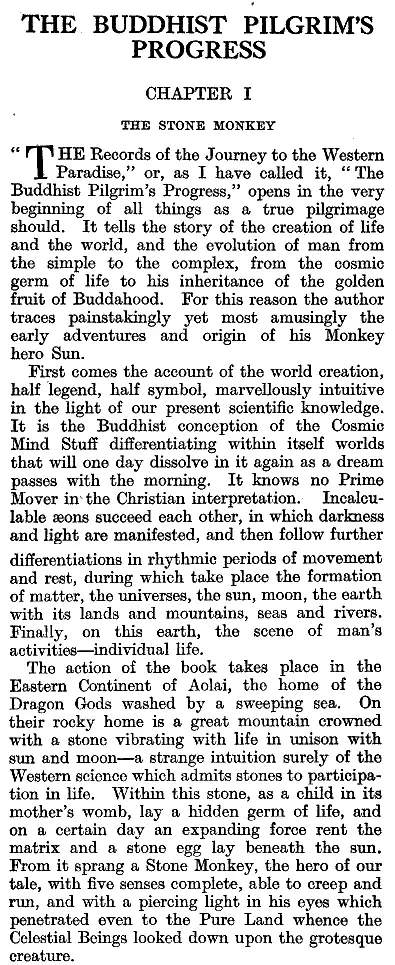
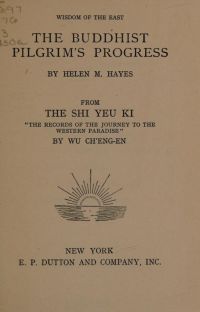
Get the Archive.org Hayes translation of The Buddhist Pilgrim's Progress
ABRIDGED.
Available as an ebook.
Who was Arthur Waley?
Arthur S. Waley was an Englishman who published English translations of many Chinese and Japanese works, including The Tale of Genji, and wrote in English about East Asian history and culture after teaching himself to read Chinese and Japanese while working at the British Museum. He never visited China or Japan, or learned to speak Chinese or Japanese.
About the Waley translation of Journey to the West
The title of Waley’s translation is Monkey: Folk Tale of China.
You can read Chapter 1 online at Annenberg Learner: Invitation to World Literature.
It has 30 untitled chapters pages divided into three parts: the first tells Monkey’s backstory, the second tells the backstory of the monk Tripitaka, and the third tells the story of their journey with two other disciples to fetch the scriptures. The first two parts follow the original fairly closely, but the journey part is much shorter than the original. Waley names the characters Monkey, Tripitaka, Pigsy, and Sandy.
In his two-page preface, Waley attributes the original to Wu Ch’eng-en. He says he chose to reduce the number of episodes of the story, rather than keep all the episodes but make each one shorter by cutting dialog. Still, he cut the poems, because poetry is notoriously difficult to translate.
Arthur’s wife Alison Waley abridged his translation. Her version, titled Dear Monkey, was published in 1973 and is out of print. It is also 30 chapters, but only about half the length. It has illustrations by Georgette Boner and a guide to pronouncing words from China and India. The Foreword says: “Arthur Waley considered dialogue—‘things said’—to be of the utmost importance since it tells us better than any descriptions about people and their true thoughts.”
Search Abebooks for Dear Monkey
Journal of Chinese Humanities: “A Comparative Study of Two Major English Translations of The Journey to the West: Monkey and The Monkey and the Monk” by Hao Ji
“Waley’s translation highlights the Monkey’s heroism and creates a fluent narrative of a hero’s growth at the cost of the religious significance of the original novel…. [H]is recreated story of the Monkey also resonates with the situation he was facing, in particular World War II.”
20th-century English Renderings of the Xiyou Ji by Radovan Škultéty
“Waley undertook the task with his trademark style and diction; the outcome was a highly readable book that has fascinated generations of English-speaking readers and saw numerous later editions and reprints…. [I]n spite of all the qualities that make Yu’s translation excel over Waley’s, one important factor somehow tips back the balance – the joy of reading. It is beyond doubt that Waley was a rarely gifted translator with an extraordinary feeling for the language. His translation is simply amusing all along.”
New York Times: “The Complete ‘Monkey’ ” by David Lattimore
“Waley’s ‘Monkey’ has several sorts of permanent value. But it must now [upon the publication of Yu’s complete translation] relinquish its always slender claim to represent, with any degree of substantiality, the Chinese original. Waley may have caught the color of Monkey’s mind, but in his 300 pages, rendering less than a third of the complete work, he made no attempt to capture the scale of the original ‘Journey to the West’: its spiritual depths or its rich variations of style.”
The Lamp: “Delirious Gallimaufry” by David Bentley Hart
“Lovell’s nonchalant terseness is faithful to the spirit of the book in ways that some of Waley’s elegant dilations are not. And hers is a genuinely entertaining work. That said, Waley’s is still the better book. For one thing, it has the feeling of a unified narrative moving inexorably toward a satisfying denouement. More to the point, it succeeds better at conveying the changing texture of the story.”
From the foreword of Kherdian’s “Monkey: A Journey to the West”:
“Waley’s version… tends to emphasize the text’s literary rather than spiritual dimension and skips over much of the original narrative (leaving out almost all of the second half of the journey), though the episodes that are included are presented in their entirety.”
In The Oxford Guide to Literature in English Translation, Peter France says: “Waley was the first to translate this picaresque novel more faithfully…. [his translation] is perhaps the most popular and widely read in the West. Demonstrating a remarkable capacity to render the dialogue and narrative with vitality and humour, Waley recreated the narrator’s tone…. His enthusiastic and fluid storytelling notwithstanding, Waley’s translation is not very accurate and has many omissions…. he actually translated quite selectively, approximately 20 chapters in all—and those only partially.”
Extract from the Waley translation of Journey to the West
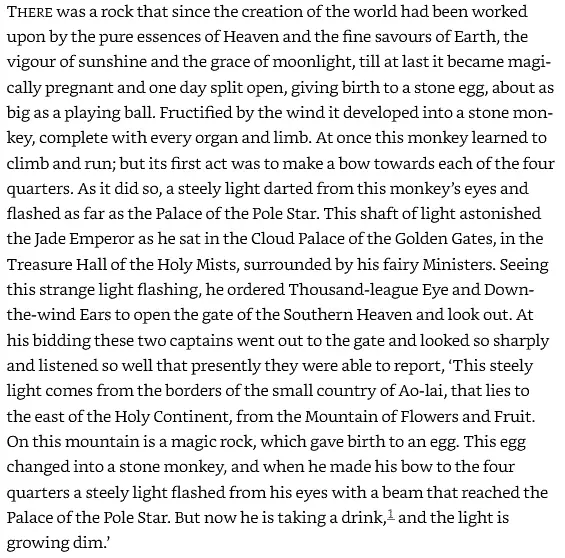
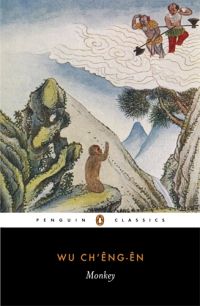
Get the Penguin Classics Waley translation of Monkey: A Folk-Tale of China
ABRIDGED.
Available as a paperback (ISBN 9780140441116, 352 pages).
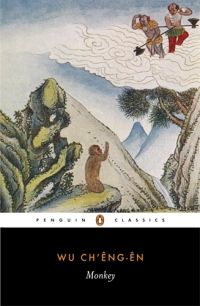
Get the Penguin Classics Waley translation of Monkey: A Folk-Tale of China
ABRIDGED.
Available as an ebook (ISBN 9780141930107).

Get the Grove Press Waley translation of Monkey: A Folk-Tale of China
ABRIDGED. Includes an introduction by Hu Shih.
Available as a paperback (ISBN 9780802130860, 320 pages).
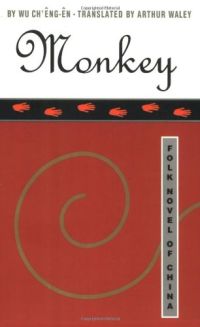
Get the Grove Press Waley translation of Monkey: A Folk-Tale of China
ABRIDGED. Includes an introduction by Hu Shih.
Available as an ebook.
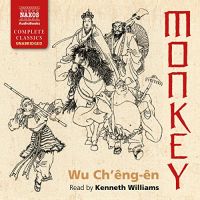
Get the Naxos Waley translation of Monkey: A Folk-Tale of China
ABRIDGED. Read by Kenneth Williams. 13h 39m.
Available as an audiobook.
Who was George Theiner?
George Theiner was a Czech poet and translator who spent part of his life in England.
» Short biography of George Theiner
About the Theiner translation of Journey to the West
The title of Theiner’s translation is The Monkey King. It is an abridgement with 39 chapters totaling 330 pages. It was edited by Zdena Novotna and whimsically illustrated by Zdenek Sklenaf. It is based on the 1961 Czech translation by Zdena Novotna.
In The Oxford Guide to Literature in English Translation, Peter France says: “Theiner’s The Monkey King, based on a Czech translation, has many inaccuracies and is much less known than Waley’s.”
This translation is out of print but still under copyright (not in the public domain).
Search Abebooks for The Monkey King
Extract from the Theiner translation of Journey to the West
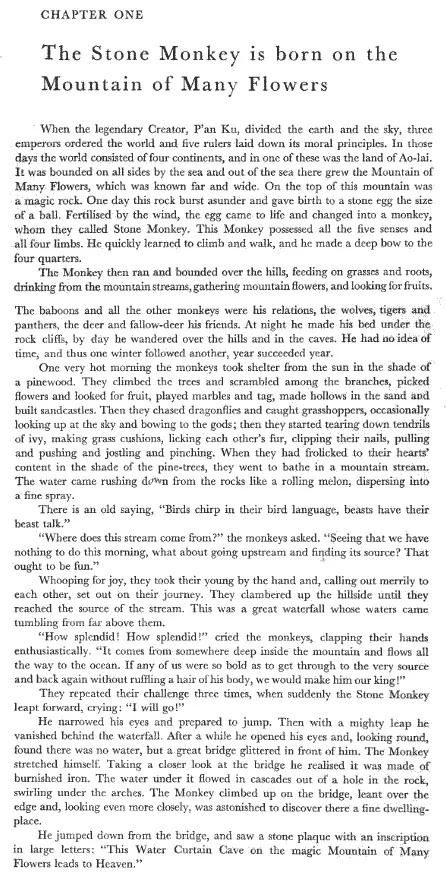
Who was Anthony C. Yu?
Anthony Christopher Yu was an American scholar of literature and religion. He was born in Hong Kong and educated in Chinese and English. He earned a bachelor’s in history and English at Houghton College, a bachelor’s in theology from Fuller Theological Seminary, and a PhD from the Divinity School of the University of Chicago. He spent decades as a professor at the University of Chicago and held positions in multiple departments. He is best known for this translation.
» University of Chicago obituary of Anthony C. Yu
» New York Times obituary of Anthony C. Yu
» Chinese Literature obituary of Anthony C. Yu
About the Yu translation of Journey to the West
Yu’s complete translation, filling 1,873 pages, was published in 1983 and, in a revised version, in 2012. Both versions include a scholarly introduction, notes and an index. The original version uses Wade-Giles Romanization, whereas the revised version uses Hanyu pinyin, which is now the standard.
Yu also produced an abridged version of his translation titled The Monkey and the Monk, which was published in 2006.
Yu does not credit the original work to Wu Cheng-en as there is no direct evidence that he was the author.
In the revised version, Yu names the characters Wukong / Pilgrim, Tripitaka / the Tang Monk, Idiot / Zhu Eight Rules, and Wujing / Flowing-Sand River / Sha Monk.
New York Times: “The Complete ‘Monkey’ ” by David Lattimore
“[Yu’s translation is] one of the great ventures of our time in humanistic translation and publication…. The most original part of his splendidly comprehensive 62-page introduction to the ‘Journey’ gives us a glimpse of his own investigations into relations between the novel and obscure portions of the vast, littleknown Taoist canon. While his translation does full justice to the adventure, lyricism and buffoonery of ‘The Journey to the West,’ it is completely sensitive to the spiritual content of the text as well…. With Monkey’s utter candor, but also with something of Monkey’s grace and strength, Mr. Yu cavorts fearlessly, and in graphic, uncondescending literalness, through more than 81 difficulties. This is the most exciting translation of any book I have read in quite some time.”
Journal of Chinese Religions: “Review of Journey to the West [2012]” by Robert E. Hegel
“[T]he real contribution here is the incomparable effect of three decades of Professor Yu’s own reading and reflection on the text, its contexts, and its meanings. The result is both an academic tour-de-force and a literary milestone: now readers of all levels of preparation can appreciate the complexity of the original in a style of English that is both complex and colloquial, engaging, and thus far more directly comparable to the rich and varied language of the original than was Yu’s earlier Journey to the West. Surely this revised edition is the crowning glory of a highly productive scholarly career, an event to be celebrated and a text worthy of very wide reading.”
Journal of Chinese Humanities: “A Comparative Study of Two Major English Translations of The Journey to the West: Monkey and The Monkey and the Monk” by Hao Ji
“Yu’s emphasis upon religious allegory in the translation is closely associated with his scholarly understanding of the intimate relationship between religion and literature.”
20th-century English Renderings of the Xiyou Ji by Radovan Škultéty
“For though Prof. Anthony Yu was not the first to produce a complete translation to a Western language nor is he the only one who has undertaken such a tremendous task, his Journey to the West has been undoubtedly the most faithful to the source text, preserving as much of the Chinese original as possible. He backed up his endeavor with the preliminary theoretical research on the novel, in addition to his solid background in religion and medieval studies, and comparative literature…. Yu’s version is basically concerned with getting things correct with detailed footnotes for fellow-academic readers.”
In The Oxford Guide to Literature in English Translation, Peter France says: “Distinguished by its extreme fidelity to the original, it allows the reader to perceive the novel not merely as a work of entertainment but as satire and religious allegory.”
Extract from the Yu translation of Journey to the West
Abridged Yu Translation:
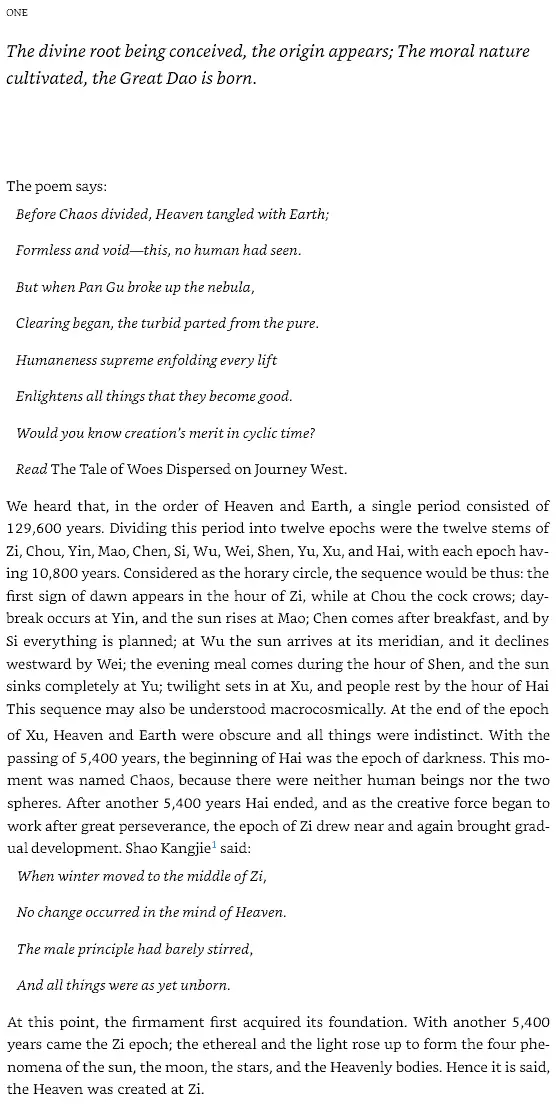
Unabridged Yu Translation
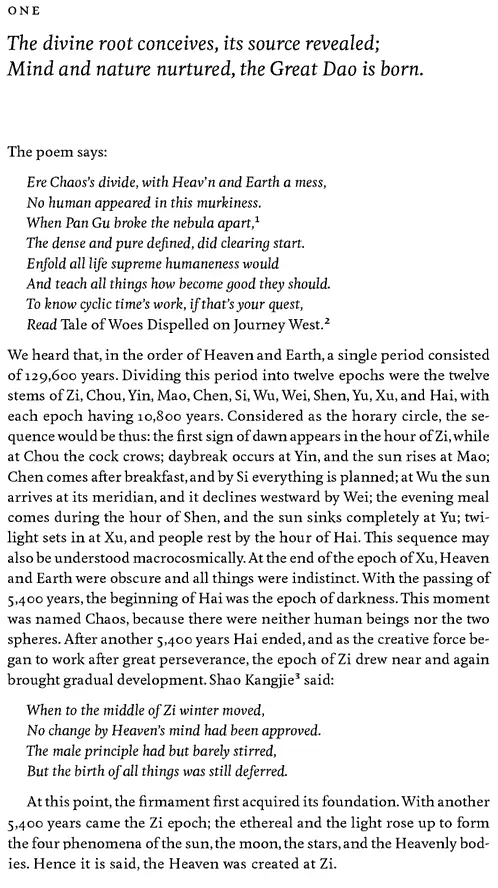
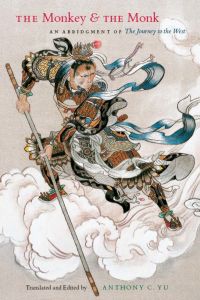
Get the University of Chicago Press Yu translation of The Journey to the West
ABRIDGED. Includes a preface by the translator.
Available as a paperback (ISBN 9780226971568, 528 pages).
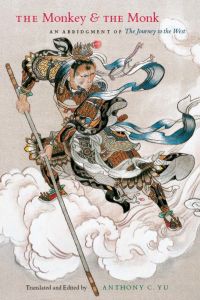
Get the University of Chicago Press Yu translation of The Journey to the West
ABRIDGED. Includes a preface by the translator.
Available as a hardcover (ISBN 9780226971551, 528 pages).
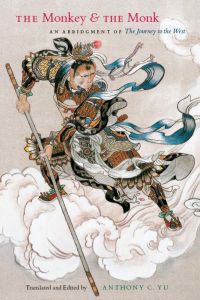
Get the University of Chicago Press Yu translation of The Journey to the West
ABRIDGED. Includes a preface by the translator.
Available as an ebook (ISBN 9780226971575).
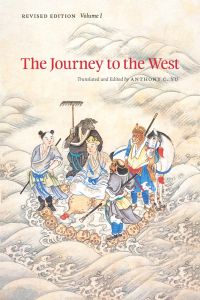
Get the University of Chicago Press Yu translation of The Journey to the West
COMPLETE. Vol 1 (Revised version of 1977 translation.) Includes original preface, preface to revised edition, list of abbreviations, introduction, endnotes, and index.
Available as a paperback (ISBN 9780226971322, 576 pages).
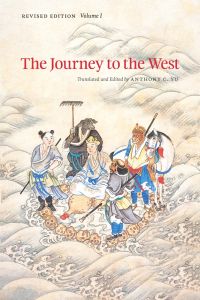
Get the University of Chicago Press Yu translation of The Journey to the West
COMPLETE. Vol 1 (Revised version of 1977 translation.) Includes original preface, preface to revised edition, list of abbreviations, introduction, endnotes, and index.
Available as a hardcover (ISBN 9780226971315, 576 pages).
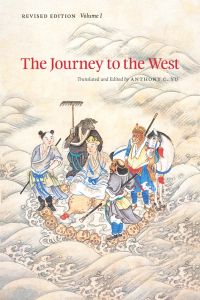
Get the University of Chicago Press Yu translation of The Journey to the West
COMPLETE. Vol 1 (Revised version of 1977 translation.) Includes original preface, preface to revised edition, list of abbreviations, introduction, endnotes, and index.
Available as an ebook (ISBN 9780226971407).
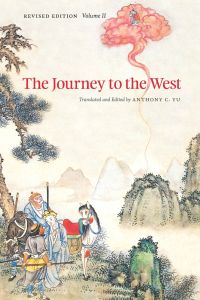
Get the University of Chicago Press Yu translation of The Journey to the West
COMPLETE. Vol 2 (Revised version of 1978 translation.) Includes list of abbreviations, endnotes, and index.
Available as a paperback (ISBN 9780226971346, 432 pages).
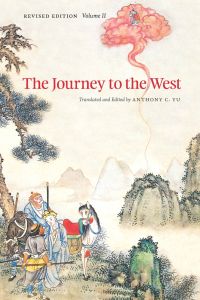
Get the University of Chicago Press Yu translation of The Journey to the West
COMPLETE. Vol 2 (Revised version of 1978 translation.) Includes list of abbreviations, endnotes, and index.
Available as a hardcover (ISBN 9780226971339, 432 pages).
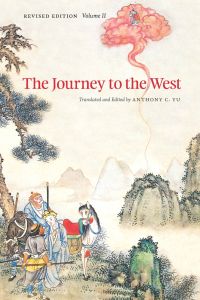
Get the University of Chicago Press Yu translation of The Journey to the West
COMPLETE. Vol 2 (Revised version of 1978 translation.) Includes list of abbreviations, endnotes, and index.
Available as an ebook (ISBN 9780226971414).
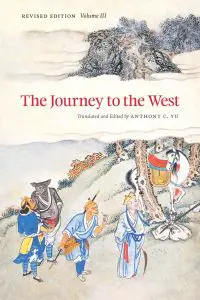
Get the University of Chicago Press Yu translation of The Journey to the West
COMPLETE. Vol 3 (Revised version of 1980 translation.) Includes list of abbreviations, endnotes, and index.
Available as a paperback (ISBN 9780226971377, 440 pages).
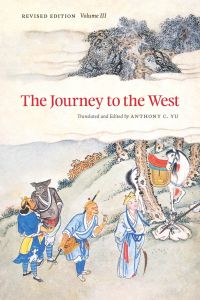
Get the University of Chicago Press Yu translation of The Journey to the West
COMPLETE. Vol 3 (Revised version of 1980 translation.) Includes list of abbreviations, endnotes, and index.
Available as a hardcover (ISBN 9780226971360, 440 pages).
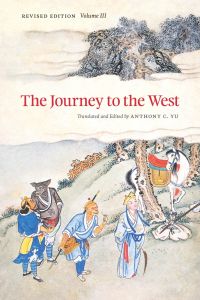
Get the University of Chicago Press Yu translation of The Journey to the West
COMPLETE. Vol 3 (Revised version of 1980 translation.) Includes list of abbreviations, endnotes, and index.
Available as an ebook (ISBN 9780226971421).
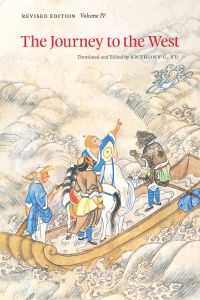
Get the University of Chicago Press Yu translation of The Journey to the West
COMPLETE. Vol 4 (Revised version of 1983 translation.) Includes list of abbreviations, endnotes, and index.
Available as a paperback (ISBN 9780226971391, 448 pages).
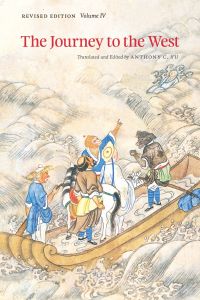
Get the University of Chicago Press Yu translation of The Journey to the West
COMPLETE. Vol 4 (Revised version of 1983 translation.) Includes list of abbreviations, endnotes, and index.
Available as a hardcover (ISBN 9780226971384, 448 pages).
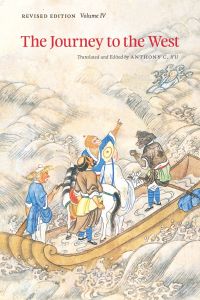
Get the University of Chicago Press Yu translation of The Journey to the West
COMPLETE. Vol 4 (Revised version of 1983 translation.) Includes list of abbreviations, endnotes, and index.
Available as an ebook (ISBN 9780226971438).
Who is William John Francis Jenner?
He is a professor and translator focusing on Chinese history, literature, and culture. He has translated poems of Lu Xun and has worked with translators Gladys and Hsien-Yi (Xianyi) Yang, who translated (among other things) A Dream of Red Mansions.
About the Jenner translation of Journey to the West
Jenner’s translation is complete. It contains all 100 chapters of the story. Also, his version includes an introduction by Shi Changyu (22 pages), an afterword by the translator (23 pages), and scattered Qing Dynasty illustrations. There are also a few short endnotes occupying one or two pages in each volume.
Jenner names the characters Monkey / Wukong, Sanzang / the Tang Priest, Pig / Zhu Bajie / Wuneng, and Friar Sand / Wujing.
You can read Chapter 15 online at Paper Republic: Chinese Literature in Translation.
20th-century English Renderings of the Xiyou Ji by Radovan Škultéty
“[I]t is eager to keep the flow and get a lively narrative across to a lay audience.”
Los Angeles Review of Books: “Journeys to the East, ‘Journey to the West’” by WJF Jenner, introduced by Nicky Harman
Nicky Harman: “How this translation eventually saw the light of day, political upheavals and attendant procrastinations notwithstanding, is an epic and a humbling story. It makes the travails of translators nowadays look very small indeed.”
Jenner: “My aim in doing Journey to the West was to make it as much fun in English as it is in the original…. Around the time I took on the translation, I wrote to Arthur Waley asking if he minded my doing a full-length version of Xi you ji, as I owed him so much for his Monkey, without which I would never have undertaken the project in the first place. He replied and graciously wished me well with it…. The Buddhist scholar Li Rongxi was invited to be an expert consultant on the Buddhist terminology and much else too. His corrections saved me from many errors…. Storytellers would break up and vary the fairly straightforward narrative and dialogue of their tale with virtuoso displays of parallel prose or verse that let them show off their linguistic invention, and this was followed by the writers of printed fiction. The verse I dealt with by using blank verse and normally following a pattern of about four stresses in each line. (Looking back I came across a quatrain that used rhyme, and regret it.) The parallel prose was fairly straightforward to deal with. Setting the lines out so that each one started a new line on the page helped make the parallels easily visible, as did indenting the passages and putting them into italics to indicate that this was formally different from the main narrative. Again I tried to use a discreet pattern of stresses to help the balance and keep the feel of a switch of genre.“
Extract from the Jenner translation of Journey to the West
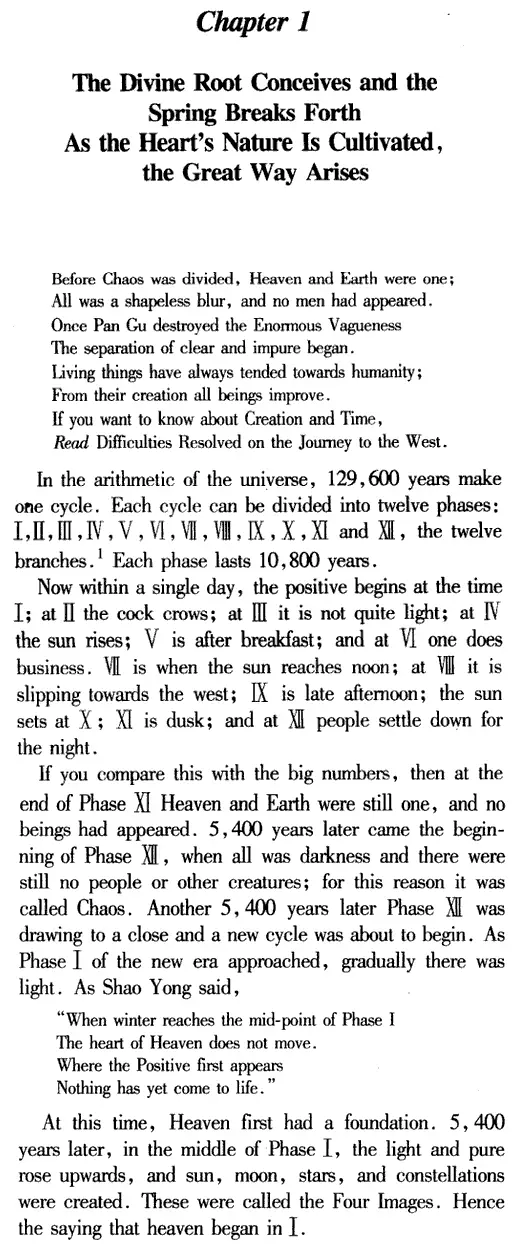
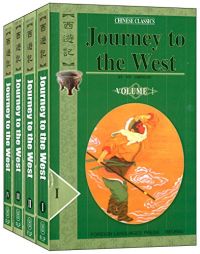
Get the Foreign Languages Press Jenner translation of Journey to the West
COMPLETE. Box set of 4 paperbacks.
Available as a paperback (ISBN 9787119016634, 2346 pages).
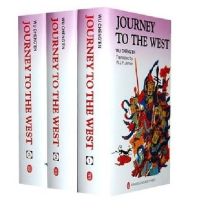
Get the Foreign Languages Press Jenner translation of Journey to the West
COMPLETE. Set of 3 hardcovers. Out of print.
Available as a hardcover (ISBN 9787119017785).
Who is David Kherdian?
David Kherdian is an Armenian-American writer.
About the Kherdian translation of Journey to the West
This is a retelling titled “Monkey: A Journey to the West.” It’s 23 chapters totaling 209 pages. It contains a three-page editor’s foreword and illustrations from a Japanese edition of Journey to the West from 1833.
Kherdian names the characters Tripitaka, Monkey, Pigsy, and Sandy.
The mission of the publisher, Shambhala Publications, is to publish books—rooted in wisdom traditions—that focus on inner transformation, enlightened living, alleviating the suffering of samsara, and countering spiritual materialism.
Extract from the Kherdian translation of Journey to the West
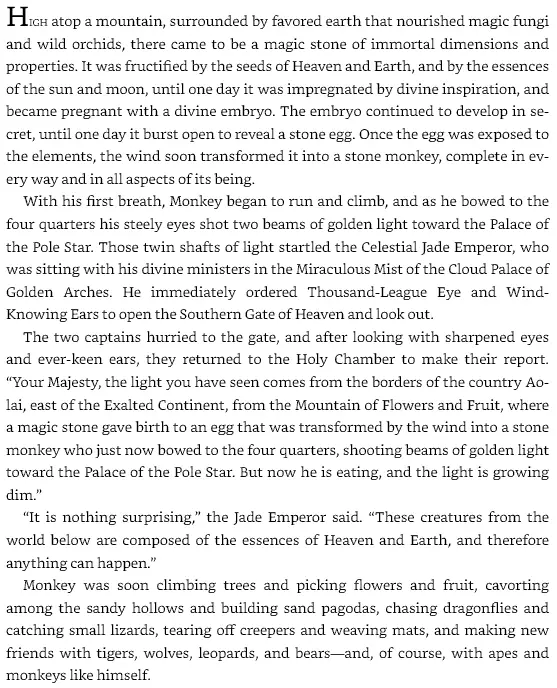
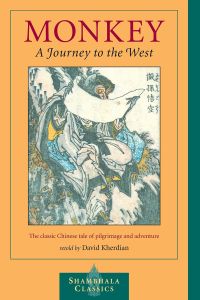
Get the Shambhala Classics Kherdian translation of Monkey: A Journey to the West
ABRIDGED. Includes a foreword by Kherdian.
Available as a paperback (ISBN 9781590302583, 224 pages).
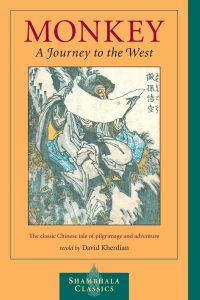
Get the Shambhala Classics Kherdian translation of Monkey: A Journey to the West
ABRIDGED. Includes a foreword by Kherdian.
Available as an ebook (ISBN 9780834824904).
Who is Julia Lovell?
Julia Lovell is a British writer, translator, and professor of Modern Chinese History and Literature.
About the Lovell translation of Journey to the West
Lovell names the characters Tripitaka, Monkey / Wukong, Pigsy, and Sandy, because these names, chosen by Waley, are already “so well known.” Her version is 36 chapters totaling 384 pages. It has an introduction and notes and a note on the translation by the translator. It includes a map, a two-page list of “principal characters,” and a foreword by Gene Luen Yang, author of American Born Chinese, a graphic novel that incorporates tales from Journey to the West (see Other Books below).
The informative introduction explains the origins and subsequent history and interpretation of the original story, but it also mentions incidents from the end of the story, so read it after reading the main text to avoid disappointment.
According to Lovell’s Note on the Translation, she omitted some episodes of the story and she edited down others. She left out almost all of the descriptive poems, but “often incorporated their descriptive elements into the surrounding prose.” Rather than try to translate (and explain) the Chinese wordplay jokes, she “tried to compensate by enhancing the humor of other parts of the narrative or dialogue.” Thus her translation “might read as a reworking as well as a translation.” Her goal was to convey the “dynamism, imagination, philosophy, and comedy” of the original Journey to the West.
This translation is the most talked about online, being the only one to come along since the beginning of the internet age. Behold the many links…
Asian Review of Books: “Review of Monkey King by Julia Lovell” by John Darwin Van Fleet
“[Lovell’s translation is] idiomatic for a 21st-century reader…. Lovell is focused on solid, modern storytelling, not mere fealty. Smaller matters such as more frequent paragraph breaks than in the Waley version ease the reader’s eye as well.”
Los Angeles Review of Books: “A Chinese Classic Journeys to the West: Julia Lovell’s Translation of Monkey King” by Minjie Chen
“This translation has earned my rating as the best English edition of the work because of the ways Julia Lovell reshaped and enhanced the text. First, with unapologetic decisiveness, Lovell cut and condensed descriptive passages and poems that contribute little to the pace of storytelling…. Lovell’s selection of episodes from the Chinese version is satisfying. Lovell’s Monkey King is about a quarter of the length of the original. Of the 81 calamities, the episodes selected for translation are representative of the diverse nature of the ordeals…. Monkey King accentuates one of the major appeals of the novel — its humor — with embellishments made by the translator in three main ways: dialogue, the culture of the immortal society, and the technicality of magic…. With its attentive reworkings of language and details, Monkey King has joined this time-honored tradition of reshaping and refreshing the old tale for a new audience.”
Asian Books Blog: “Julia Lovell’s new translation of Monkey King: Journey to the West is a tour de force” by Nicky Harman
“[Q]uite a lot of the comedy in Lovell’s translation exploits the comic potential of English, rather than that of the Chinese. Monkey muses and fulminates. Tripitaka needles and wheedles, when he’s not blubbing in terror. The monkeys shriek and chatter. There are delicious dashes of alliteration. In chapter 15, Monkey calls the horse-eating dragon a ‘Lawless loach!’ Alliteration does not work in the same way in Chinese, so this is the translator’s voice, but entirely in the spirit of the original.”
The Washington Post: “The action-packed saga ‘Monkey King: Journey to the West’ gets a modern take” by Michael Dirda
“Because the novel’s Chinese vernacular is both vulgar and linguistically playful, Lovell’s translation adopts a snappy contemporary vibe…. [A]ll this sounds pretty entertaining, rather like a kung fu or superhero film. Monkey and Pigsy even exchange the de rigueur banter and mutual putdowns of such action movies. Unfortunately, there’s just no real suspense to the various challenges facing our heroes…. I wanted to like the book more. Even abridged to a quarter of the original, its long central section struck me as repetitive, tedious and cartoonishly crude. Overall, ‘Monkey King’ lacked the charm of Western fairy tales, medieval chivalric romances or ‘The Arabian Nights,’ each of which it occasionally resembles.”
Asia Media International: “Monkey King: Journey to the West (2021) – Translating a Chinese Classic for a Contemporary Audience” by Alec Farmer
“This translation by Lovell infuses contemporary English dialogue and vocabulary into the story to turn Monkey King: Journey to the West into a very different reading experience than what many English readers may be familiar with (trust me though, that is a good thing)…. Lovell’s dedication to learning about Chinese culture, language, and history allows her translations to be both innovative and faithful…. While Monkey is by nature a mischievous and fun character to follow, it is through Julia Lovell’s translation and voice that I found myself captivated by his quick wit.”
South China Morning Post: “ReviewMonkey King brought vibrantly to life for 21st century readers by translator Julia Lovell” by Jonathan Chatwin
“Lovell’s characters speak in colloquial voices, which brings them vividly to life for modern readers. Her Monkey King is accessible enough to be read with young children – not something that could necessarily be said for other translations.”
San Francisco Chronicle: “Review: New ‘Monkey King’ translation feels like the best Pixar adventures” by Leland Cheuk
“[This] is a breezy, action-packed narrative that never pauses to surface the novel’s Buddhist themes and is peppered with Western colloquialisms like ‘Back in a jiffy!’ to replace any wordplay that would have required footnotes.”
Books and Bao: “Why Monkey King is One of the Four Great Chinese Novels” by Willow Heath
Lovell “injects Monkey King with so much camp and colour and wit and humour. The book sparkles and crackles with a uniquely British wit. Every line of dialogue drips with sarcasm, snappy one-liners, and laugh-out-loud observations for the lovable bastard that is Monkey. If you’ve ever wanted to read Journey to the West but have been put off by fears of it being too long, too dense, too dry (as we have all thought when it comes to classics), then put those fears aside. Julia Lovell’s translation is nothing but fun, frantic fantasy writing.”
The Lamp: “Delirious Gallimaufry” by David Bentley Hart
“Lovell better communicates the violence of the book, in all its often cartoonish (or perhaps Monty Python-esque) excessiveness, as well as certain of the more disconcerting elements of the original, such as Tripitaka’s relentless querulousness and timidity, or Pigsy’s persistent malice toward Monkey, not to mention the extraordinary irreverence with which the book treats all three of China’s major traditions, Confucianism, Taoism, and Buddhism…. Lovell’s approach places a particular stress on the more raucous aspects of the novel. In part she accomplishes this through the use of a much more hurried and abrupt prose style than Waley’s, and in part simply by writing in the less conventionally adorned literary language of our time. At several junctures, she tries to communicate the humor of the original elliptically, not by attempting to translate untranslatable jokes, but by substituting anachronistic or jarringly incongruous idioms for them: heaven “runs a cashless economy,” or “Win-win,” or “Eat my staff!” Sometimes this is amusing; at other times, as in the third of the examples just given, it feels more forced than clever and quickly becomes tiresome. But, on the whole, Lovell’s nonchalant terseness is faithful to the spirit of the book in ways that some of Waley’s elegant dilations are not. And hers is a genuinely entertaining work.”
Charlie Reads China: “Review #17: Monkey King”
“Lovell translates with a punchy style that is tonally closer to comic English writing and really made me chuckle…. Lovell finds humour in playing with the expectation of literary Chinese being translated into highfalutin English in the prose (with the occasional phrase like ‘for it was he’ delivered with a wink), puncturing pretensions with more informal modern language (‘don’t mention it’; ‘compadres’; ‘living their best lives’)…. As well as the pleasingly bonkers passages, the slapstick and burlesque, the puns, and the witty changes of tone, it’s also occasionally quite dark…. Lovell has chosen a different selection of episodes of the journey itself than Waley, only overlapping (I think) in the series of competitions with Immortals. Lovell has chosen more and shorter escapades.”
From Gene Luen Yang’s Foreword to Julia Lovell’s Monkey King:
“The monkey king’s story reverberates across continents and cultures. Journey to the West is the very definition of timeless. And that’s why new translations like the one you’re about to read are so important. They brush off the dust so that we can rediscover what is lasting.”
From Lovell’s introduction:
“[I]nterpretations of the novel divide between two camps: critics who see Journey to the West as a religious allegory for the human condition and those who see it as good-humored supernatural slapstick…. [T]he book is too open to support a single allegorical interpretation. Although the travelers’ quest is ostensibly spiritual, the book is profoundly irreverent toward religious and moral authority…. The satire and indignity to which the book subjects representatives of all three religions [Confucianism, Buddhism, and Taoism] indicates the novel is not interested in cheerleading for any of the faiths.”
Extract from the Lovell translation of Journey to the West
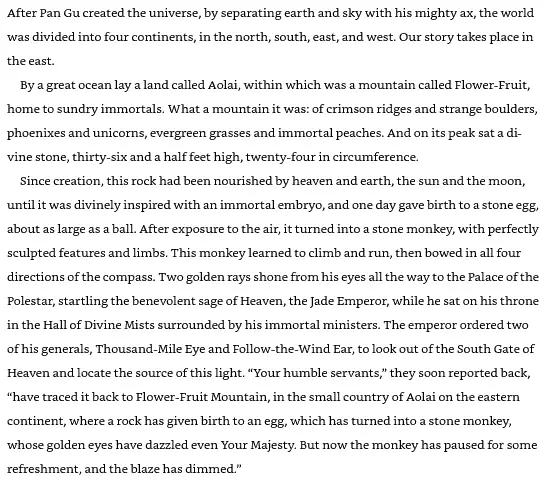
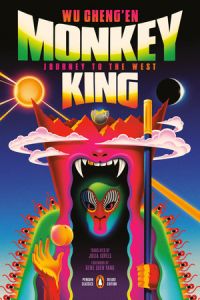
Get the Penguin Classics Deluxe Lovell translation of Monkey King: Journey to the West
ABRIDGED. Includes a foreword by Gene Luen Yang, an introduction and notes by Julia Lovell, and a map.
Available as a paperback (ISBN 9780143136309, 384 pages).
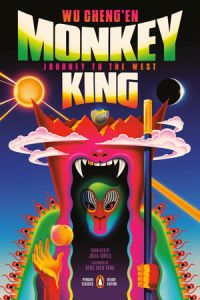
Get the Penguin Classics Lovell translation of Monkey King: Journey to the West
ABRIDGED. Includes a foreword by Gene Luen Yang, an introduction and notes by Julia Lovell, and a map.
Available as an ebook (ISBN 9781101600979).
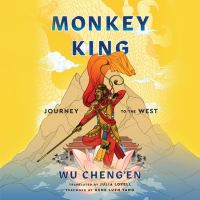
Get the Penguin Audio Lovell translation of Monkey King: Journey to the West
ABRIDGED. Read by Robert Wu. 838 minutes.
Available as an audiobook (ISBN 9780593393383).
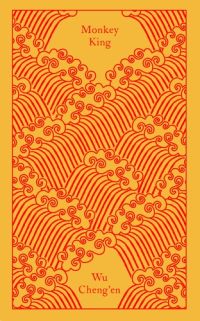
Get the Penguin Clothbound Classics Lovell translation of Monkey King: Journey to the West
ABRIDGED. Includes a foreword by Gene Luen Yang, an introduction and notes by Julia Lovell, and a map.
Available as a hardcover (ISBN 9780141393445, 384 pages).
Journey to the West: Reference Sites
» Invitation to World Literature: Journey to the West
Online course materials for studying the text using a chapter of Waley’s version of the story. Suitable for grade 9 and up.
» Journey to the West Research
“My name is Jim R. McClanahan, and I have a degree in Anthropology and minors in Chinese and art history. I’m a big fan of the great 16th-century Chinese Classic Journey to the West. This blog will serve as an archive for my research into the historical, religious, and folklore origins of the novel.”
» Journey to the West Library
“This blog site, Journey to the West Library, serves as a platform for exploration into the infamous 16th-century Chinese classic novel, Journey to the West (xiyouji, 西游记). This site will host a range of studies, research, lists, theories, along with a bunch of miscellaneous features on all things Journey to the West!”
» Journey to the West Fandom Wiki
Proof that Journey to the West is not just culture, it’s also pop-culture.
Journey to the West: TV & Film Adaptations
A complete discussion of the tv series and movies made from Journey to the West is outside the scope of this page. Look these up if you’re interested in knowing more!
Saiyuki / Monkey (1978 Japanese live-action TV series)
I don’t know much about it, but this fansite does.
Journey to the West (1986 Chinese TV series)
This is the one I keep hearing about. If you know anything about Journey to the West through cultural osmosis, it’s most likely because of this TV show. Yes, there have been other television adaptations, but despite huge leaps in special effects capabilities in the last four decades, none of the newer versions have replaced this one in people’s hearts.
» YouTube: Journey to the West Episode 1 (w/ English subtitles)
The Forbidden Kingdom (2008 movie starring Jackie Chan and Jet Li)
I watched this when it came out because it had Jackie Chan’s name on it. My impression is that it’s only loosely related to Journey to the West.
Chinese movies
A Chinese Odyssey Part One & Two (1995)
A Chinese Odyssey Part Three (2016)
Journey to the West: Conquering the Demons (2013)
Journey to the West: The Demons Strike Back (2017)
The Monkey King (2014)
The Monkey King 2 (2016)
The Monkey King 3 (2018)
Wu Kong (2017)
Dragonball
Yeah, apparently Son Goku is Sun Wukong. This article outlines the similarities.
Here’s some more explanation.
Journey to the West: Other Books
The book list below is not comprehensive; there have been numerous adaptations, many of them illustrated or for children or both, and there’s at least one adaptation for Chinese language learners (like me!). These are the adaptations that caught my attention, plus a couple of related books that talk about or incorporate elements of Journey to the West.
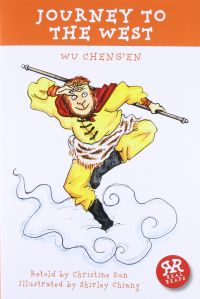
Get Journey to the West by Christine Sun
Children's version retold by Christine Sun and illustrated by Shirley Chiang, published by Real Reads, 2011.
Available as a paperback (ISBN 9781906230340, 64 pages).
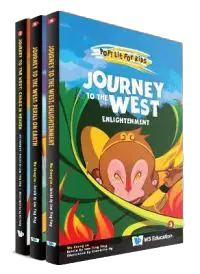
Get Journey to the West by Ying Ping Low
Three-volume children's version retold by Ying Ping Low and illustrated by Hui Fong Ng, published by World Scientific, 2022.
Available as a paperback (ISBN 9789811258312, 312 pages).
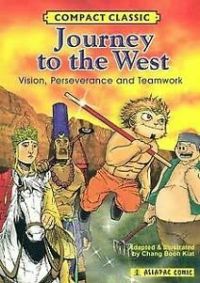
Get Journey to the West by Chang Boon Kiat
Black-and-white comic book adapted and illustrated by Chang Book Kiat, translated by Geraldine Goh, YN Han & Mint Kang, published by Asiapac Books, 2009.
Available as a paperback (ISBN 9789812295064, 199 pages).
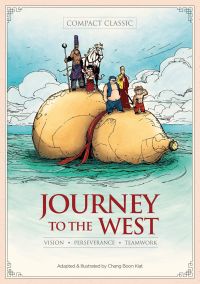
Get Journey to the West by Chang Boon Kiat
Full-color comic book adapted and illustrated by Chang Book Kiat, translated by Geraldine Goh, YN Han & Mint Kang, published by Asiapac Books, 2018.
Available as a paperback (ISBN 9789812297181, 176 pages).
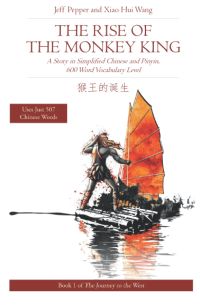
Get The Journey to the West by Jeff Pepper and Xiao Hui Wang
Adaptation created for learning to read Chinese. Uses Simplified Chinese with Pinyin. English version included at the back. Part 1 of 31. Published by Imagin8 Press.
Available as a paperback (ISBN 9781952601057, 119 pages).
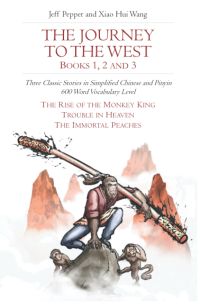
Get The Journey to the West by Jeff Pepper and Xiao Hui Wang
Adaptation created for learning to read Chinese. Uses Simplified Chinese with Pinyin. English version included at the back. Parts 1, 2, and 3 of 31. Published by Imagin8 Press.
Available as a paperback (ISBN 9781733165044, 303 pages).
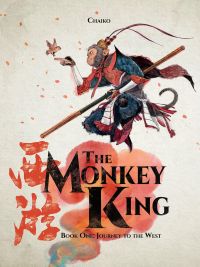
Get The Monkey King by Chaiko Tsai
Vol 1 of two-part graphic novel from Magnetic Press.
Available as a hardcover (ISBN 9781951719685, 160 pages).
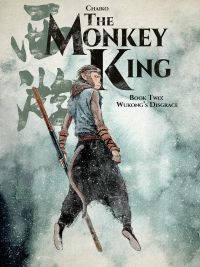
Get The Monkey King by Chaiko Tsai
Vol 2 of two-part graphic novel from Magnetic Press.
Available as a hardcover (ISBN 9781951719692, 160 pages).
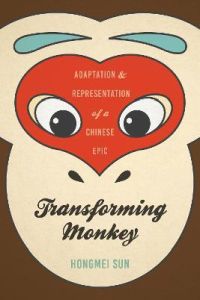
Get Transforming Monkey: Adaptation and Representation of a Chinese Epic by Hongmei Sun
"Transforming Monkey provides a renewed understanding of the Monkey King character as a rebel and trickster, and demonstrates his impact on the Chinese self-conception of national identity as he travels through time and across borders."
Available as a paperback (ISBN 9780295743196, 232 pages).
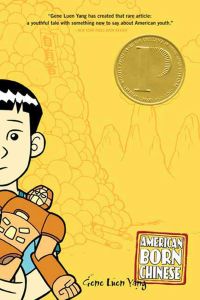
Get American Born Chinese by Gene Luen Yang
"A tour-de-force by rising indy comics star Gene Yang, American Born Chinese tells the story of three apparently unrelated characters: Jin Wang, who moves to a new neighborhood with his family only to discover that he's the only Chinese-American student at his new school; the powerful Monkey King, subject of one of the oldest and greatest Chinese fables; and Chin-Kee, a personification of the ultimate negative Chinese stereotype, who is ruining his cousin Danny's life with his yearly visits. "
Available as a paperback (ISBN 9780312384487, 240 pages).
What’s the best Journey to the West translation?
As with so many questions, the answer depends on your context.
» If you want to read the classic abridgement that many people are already familiar with, read Waley’s abridgement Monkey.
» If you are serious about reading the entire Journey to the West, and you don’t care how long it takes, and you want to read and also understand as much as possible, get the unabridged translation by Yu.
» If you like the idea of a short but faithful translation, read Yu’s abridgement of his full-length version, titled The Monkey and the Monk.
» If you like the idea of reading something ancient and obscure rendered into an accessible, modern, snarky tone, read Lovell’s abridgement, Monkey King.
If you already have a favorite, let us know in the comments which one you like best and why!

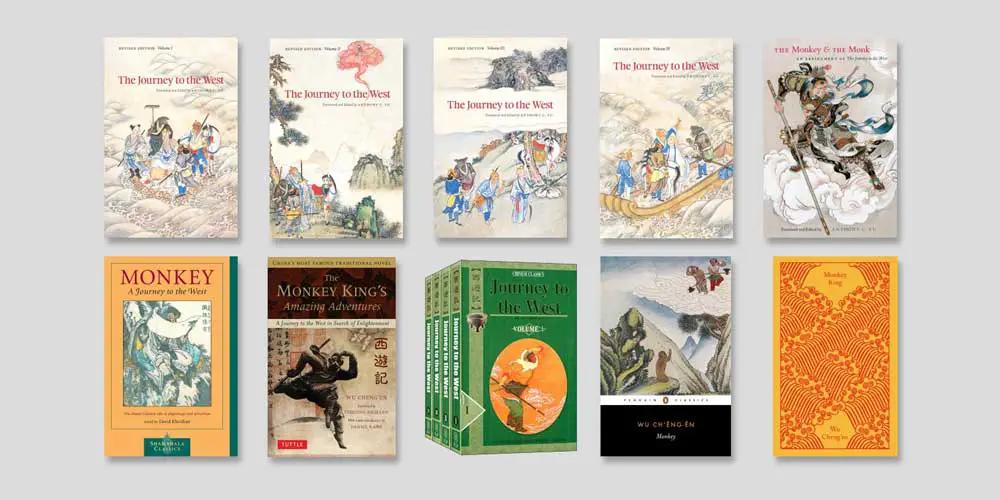
I just finished the Yu unabridged series, and found it readable enough, although not without its flaws. If I’d seen ‘vegetarian meal’ one more time, I would have run a magnet over my Kindle. We get it–the meals were vegetarian, but after the first, oh, 25 mentions of what kind of meal was on offer, it gets old. Would it really have hurt anything to vary it up with ‘sacred’ or ‘ritual’ or ‘sacramental’ or even ‘Buddhist’?
The first volume is a little ponderous; it seems that Yu was trying too hard to get it right at this stage, but after the 10th or so chapter, he seems to get into his groove and loosen up. Then it’s a walloping good adventure yarn.
The story itself is so much funnier than I expected, and my husband finally said he needed his sleep, so I couldn’t read it in bed anymore if I couldn’t stop guffawing at the many antics and just plain hilarious remarks of the Monkey King.
Thanks for sharing your thoughts, Aquaria!
Do you mind sharing, how long did it take you to read the whole thing? It sounds like you were really into it!
I have mixed feelings about the repetition you mention, and the idea of changing it up. From what you say, it sounds like this particular phrase should have been handled differently so as not to call so much attention to itself! But maybe (just speculating…) there’s some special reason the phrase keeps repeating?
I wonder if ‘vegetarian’ was only implied in the original, and Yu added it because otherwise we might not have known that it was implied. That could have been handled with a note rather than inserting the word every time, though, so I’m guessing it was actually there. If it was there and it was really the same Chinese word every time, maybe the word had some sort of appropriate ‘poetic’ sound or made the phrase have a suitable length or something, and Yu just kept it, even though it sounds awkwardly emphatic in English. The repetition or the word choice could be significant to the author for reasons like this, so it might break an important pattern to use different words on different occasions. (I think this is a problem for translators of Proust.)
Journalists are sometimes accused of unnecessary, overwrought “elegant variations” such as “elongated yellow fruit” for “banana”. So it could be that Yu consistently used “vegetarian” to avoid this kind of accusation.
On a related note: I’ve been told that Chinese students (in modern times, not sure about previously) are taught NOT to consistently use the same word, that it is more elegant to use different words in their writing. Unfortunately, one result is, I’m seeing scientists in China write papers in English in this ‘elegant’ way. It sometimes sounds like they don’t know what they’re talking about, because they keep using different (sometimes unsuitable) words for the same thing, instead of being clear and consistent. Sigh.
I guess the upshot is, creating exactly the right amount of vocabulary consistency is hard!